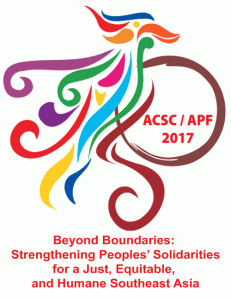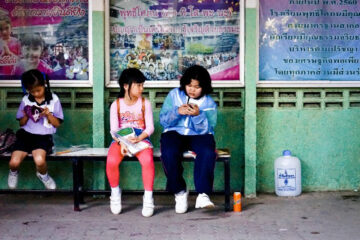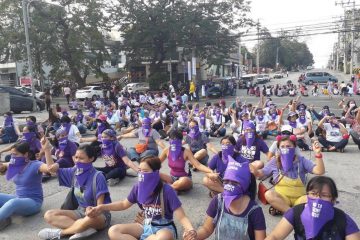
CIVIL SOCIETY IN SOUTHEAST ASIA: ASEAN FOR WHOM?
WHY PREVENT PEOPLE FROM JOINING FORUMS TACKLING ISSUES IN ASEAN?
PRESS RELEASE
November 4, 2017
Contact persons: Rhoda Viajar @09178250346 (ACSC/APF2017 Media Officer) / Malu Mendoza @09328726168 (ACSC/APF2017 ICOM Team)
A network of civil society groups engaging the Association of Southeast Asian Nations (ASEAN) raised alarm over attempts and malicious insinuations by authorities to undermine legitimate forums and prevent participants from joining people’s/civil society-initiated assemblies that will tackle urgent issues in Southeast Asia in connection with the upcoming 31st ASEAN Summit in Manila on 12-14 November 2017.
The ASEAN Civil Society Conference/ASEAN Peoples’ Forum (ACSC/APF) expressed its apprehension and dismay amid two recent incidents.
First, the Department of Interior and Local Government implied in a news report that an ASEAN Youth Forum is a ‘bogus’ ASEAN forum. DILG OIC Catalino Cuy was quoted by news reports as saying: “We want to make it clear that AYF 2017 organized by certain groups is not at all related to the Asean meetings being hosted by our country. It is a standalone activity whose goals are different and separate from the Asean.” Furthermore, he claimed there are reports pointing to the youth forum “being used by leftist groups to advance their agenda.”
Second, four ACSC/APF2017 delegates from Timor Leste are currently being held by the Bureau of Immigration at the Ninoy Aquino International Airport despite the former having complied with immigration requirements and the absence of any travel ban on any of them. Having no valid reason to detain these foreign visitors, immigration officials must immediately release them and allow them entry into the country.
Ms.Jelen Paclarin, chair of the ACSC/APF Regional Steering Committee, said civil society groups are “extremely disturbed by these incidents as we expect more participants from ASEAN member countries entering the Philippines to join the preparatory and actual ASEAN Civil Society Conference/ASEAN Peoples’ Forum on November 10-14, 2017.”
“The ACSC/APF is a legitimate process steered by many organizations and movements across the ASEAN region, upholding the value of democratic participation of civil society. In many instances, ACSC/APF resulted in direct dialogues with ASEAN officials, including heads of states,” she clarified.
Paclarin pointed out that since the Philippines chairs the ASEAN 2017, the ACSC/APF National Organizing Committee has been discussing with the government officials involved in ASEAN about the ACSC/APF statements as well as updates on the Peoples’ Forum and other related activities.
“There was even a dialogue with some ASEAN ministers at the sideline of the 30th ASEAN Summit in April 2017. About 50 civil society networks from all over Southeast Asia attended this dialogue with ASEAN ministers,” she said.
Prof. Eduardo Tadem, ACSC/APF National Organizing Committee Co-Convener, added, “Philippine government officials are fully aware of and are involved in our and various sectors’ engagement in the ASEAN processes. So we are deeply concerned that these incidents are happening now, especially since we have never encountered such tight control in previous large regional and international peoples’ forums.”
“We hope we are wrong, but these incidents will only show that the 30th ASEAN Chair’s Statement was yet another lip service, especially that which pertains to the people,” he said.
The Chairman’s Statement at the ASEAN Summit on 29 April 2017 stated ASEAN Heads of State recognizing the importance of engagement and dialogues with the youth and the ACSC/APF:
“We had a productive Interface with ASEAN Youth Representatives and took note of their aspiration to contribute towards the realization of the ASEAN Community Vision 2025 with their innovation and creativity…We recognized the role that the youth has in community-building, and gave our highest assurances of support for the five priority areas of the ASEAN Work Plan on Youth 2016-2020 …
We recognized the importance of engagement and regular dialogue with civil society organizations (CSOs) as an important part of building a people-centered, people-oriented Community, and of attaining ASEAN Vision 2025. We note the initiative of the Chair to organize a Dialogue between ASEAN and the ASEAN Civil Society Conference/ASEAN Peoples’ Forum (ACSC/APF) and the recommendations of the latter.”
“These incidents today show that the trend of shutting out people’s voices and government’s accompanying threats are real. The democratic spaces for people in Southeast Asia is indeed shrinking. We ask: Whose interests does ASEAN really serve?” he concluded.#
![]()



0 Comments